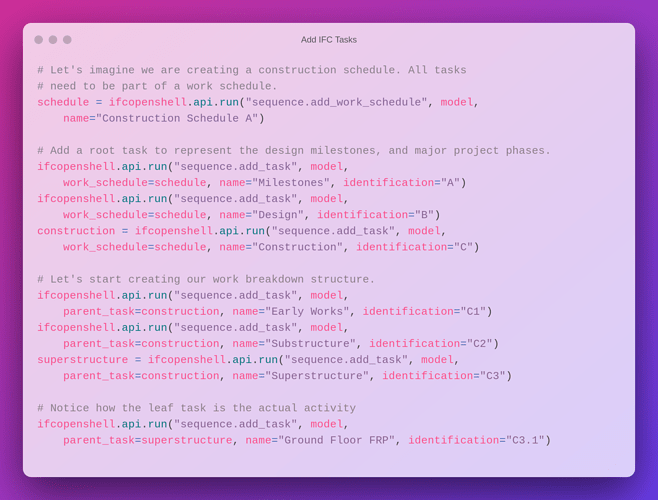BlenderBIM Add-on v0.0.230107 has been released with 201 new features and fixes. It’s our built environment, help support the BlenderBIM Add-on: 100% free and open source software that lets you author and document BIM data fully to ISO standards. It’s built by the AEC community, for the AEC community. Get it today: https://blenderbim.org/
Release base rabbit image AI-generated by Farfadet46.
Warning, this release is primarily aimed at developers, with not many user-facing changes but lots of software upgrades, experimental code, and documentation. As usual, the BlenderBIM Add-on is alpha software, but this release may be significantly more alpha than usual.
Experimental IfcSverchok release
Thanks to the incredible work by Martina Jakubowska in the Google Summer of Code programme 2022, we now have a prototype implementation of IfcSverchok. Buildings modeled using visual Sverchok nodes can now be converted parametrically into IFC models. Like the rest of the BlenderBIM Add-on, IfcSverchok is a native IFC visual node programming environment. 15 basic nodes have been implemented so far, ranging from creating entities, adding properties, converting Sverchok geometry, converting Blender geometry, and filtering by type.
In addition, there is now experimental Sverchok integration for parametric IFC element. Any IFC element can now be defined via a Sverchok graph and modified parametrically across IFC round trips.
New BCF library
The BCF library has been rewritten almost completely from scratch by Andrea Ghensi (sanzoghenzo). This new library has significantly improved performance and can be used to create much larger BCF topic collections. Unfortunately, these have not yet been implemented in end-user utilities like the BlenderBIM Add-on or IfcClash so users wishing to use those functions should use an older version as breakage will occur.
4D improvements
Major bugs with Asta PowerProject imports have been resolved. A huge amount of work by Yassine Oualid means you can also now easily select nested task outputs, display number of resources used by a task, display scheduled resource usage within the resource tree, and see total task assignments for elements. You can also now customise 4D animation colours, and add a visual task bar with customised colours.
Stair, steel and Australian furniture library
The existing stair generator can now be used to modify IFC stair flights, and also now supports individual stair treads (such as for steel or wood stairs) instead of monolithic concrete stairs. The results are parametric and can be regenerated after an IFC round-trip.
Cold rolled Australian Cees and Zeds have now been added to the steel library. In addition, 150 new furniture have been added based on Australian and metric Neufert dimensions, such as beds, tables, chairs, sofas, sanitary fixtures, and more.
For developers, a new ShapeBuilder class makes it easy to programmatically generate IFC representations made out of 2D profiles and 3D extrusions.
Extensive API documentation
Almost an entire book’s worth of documentation has been written for the hundreds of functions for the IfcOpenShell API. Documentation is incredibly detailed, featuring well commented code examples dealing with real life design and construction situations. For any developer new to Python, IfcOpenShell, or IFC, this is a critical resource to help you pick up the skills you need. Check out the IfcOpenShell API docs in particular.
IfcOpenShell for the web (WASM)
Thanks to work by core developer Thomas Krijnen, IfcOpenShell can now be combined with Pyodide to be used on the web. When you build IFC web applications with IfcOpenShell, you benefit from the decades of careful battle testing and extensive native IFC authoring API support provided by IfcOpenShell-Python. Proof of concepts have been released for native authoring of point-and-click IFC walls right in your browser. See the code.
So much more
Continuing on the quantity take off function lists from the last release, Massimo Fabbro has been hard at work mapping many quantity take off definitions to these functions. IfcOpenShell is now also available for Python 3.11. IFC validation now also supports express rule checking, which means that it is now even easier to guarantee high quality valid IFC models. Derived attributes are now supported in IfcOpenShell. Thanks to Cyril Waechter, IfcPatch now works with IFCZIP and IFCXML, various fixes for energy boundaries, and a stable AUR package is now available for Arch Linux.
The consolidated branding and fundraising drive between the IfcOpenShell and BlenderBIM Add-on websites have helped raise enough funds to allow for continuous funding of part time development for the entirety of 2023.
A huge thanks to the growing volume of new contributors who are joining the team and changing the industry. You can too!
All changes
All changes can view the directly via the Git logs here:
Credits for this release (in order of commits via git shortlog -sn --since "2022-11-06"):
66 Dion Moult
33 Martyna Jakubowska
23 Thomas Krijnen
19 CyrilWaechter
18 Sigma Dimensions
16 Massimo Fabbro
14 Andrej730
5 Ryan Schultz
2 Kristoffer Andersen
1 Andrea Ghensi
1 Erik Abrahamsson
1 Otso Alho
1 Vukas Pajic
1 fbpyr




